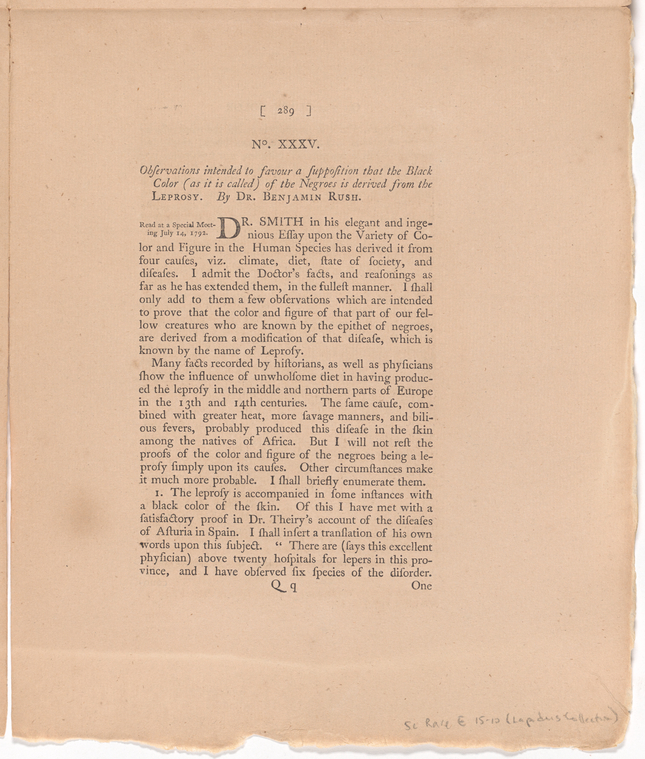Doc Chat, Research at NYPL
Doc Chat Episode Thirty-One: Race and Slavery's Pandemic Legacies
On September 23, 2021, Doc Chat kicked off an exciting fall season by exploring the complex history of slavery, race, and disease.

A weekly series from NYPL's Center for Research in the Humanities, Doc Chat pairs a NYPL curator or specialist and a scholar to discuss evocative digitized items from the Library's collections and brainstorm innovative ways of teaching with them. In Episode Thirty-One, historians Michelle Commander and Christopher Willoughby discussed the racialization of disease in the late eighteenth and nineteenth centuries, analyzing a 1802 medical advice manual for treating enslaved people in the Caribbean and a 1799 pamphlet that argues that blackness (skin color) is a form of leprosy.
Michelle Commander is associate director and curator of the Lapidus Center for the Historical Analysis of Transatlantic Slavery at the Schomburg Center for Research in Black Culture. Christopher Willoughby is the Molina Fellow in the History of Medicine & Allied Sciences at the Huntington and a Visiting Scholar in the Charles Warren Center for Studies in American History at Harvard University. They are the organizers of this year's Lapidus Center conference, Pandemic Legacies: Health, Healing, and Medicine in the Age of Slavery and Beyond, which was held October 6 – 8, 2021—more on the conference below.
Doc Chat Episode 31: Race and Slavery's Pandemic Legacies from The New York Public Library on Vimeo.
A transcript of this episode is available here.
Below are some handy links to materials and sources suggested in the episode.
Episode Thirty-One: Primary Sources
Michelle and Chris analyzed the following two documents:
1. James Grainger, An Essay on the More Common West-India Diseases, and the Remedies Which That Country Itself Produces: to Which Are Added, Some Hints on the Management, &c. of Negroes, 1764. (Mundell & Son, and Longman & Rees, London, 1802). Note: while this document is not availble on NYPL's Digital Collections, you can access a high quality PDF of a selection of the pamphlet here.

Episode Thirty-One: Readings and Resources
Eric Herschthal, "Antislavery Science in the Early Republic: The Case of Benjamin Rush" Early American Studies 15:2 (Spring 2017), 274-307.
Rana A. Hogarth, Medicalizing Blackness: Making Racial Difference in the Atlantic World, 1780-1840 (University of North Carolina Press, 2017).
Manisha Sinha, The Slave's Cause: A History of Abolition (Yale University Press, 2016).
Sasha Turner, Contested Bodies: Pregnancy, Childrearing, and Slavery in Jamaica (University of Pennsylvania Press, 2017).
The 2021 Lapidus Conference: Pandemic Legacies
Two weeks after this episode, the Lapidus Center for the Historical Analysis of Transatlantic Slavery held its annual conference, focusing on on slavery, race, pandemics, and medicine, All sessions from the conference were recorded and can be accessed at the Schomburg Center's Livestream account. Highlights include Wednesday's opening plenary; Friday's Keynote Panel, "Legacies," featuring a conversation with Deirdre Cooper Owens and Harriet Washington; and Friday's Session 10, "Psychiatry and Mental Health in the Shadow of the Plantation."
Join the Doc Chat Conversation
Doc Chat episodes take place on Zoom every Thursday at 3:30 PM. Check out upcoming episodes on NYPL's calendar, and make sure you don't miss an episode by signing up for NYPL's Research newsletter, which will include links to register. A video of each episode will be posted on the Doc Chat Channel of NYPL's blog shortly after the program. There you can also explore videos and resources for past episodes. See you at the next Doc Chat!
Read E-Books with SimplyE
 With your library card, it's easier than ever to choose from more than 300,000 e-books on SimplyE, The New York Public Library's free e-reader app. Gain access to digital resources for all ages, including e-books, audiobooks, databases, and more.
With your library card, it's easier than ever to choose from more than 300,000 e-books on SimplyE, The New York Public Library's free e-reader app. Gain access to digital resources for all ages, including e-books, audiobooks, databases, and more.
If you don’t have an NYPL library card, New York State residents can apply for a digital card online or through SimplyE (available on the App Store or Google Play).
Need more help? Read our guide to using SimplyE.